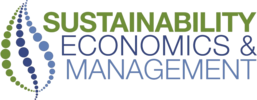General conditions:
Duration: 1 semester
Frequency: annual, summer or winter semester
Learning/teaching format: Lecture, seminar and exercise
Language of instruction: English
ECTS credit points: 6.00
Workload: 180 hours, of which attendance time: 56 hours
Module content:
The module "Digital Strategy and Sustainability" offers an insight into the diverse and rapidly developing areas of application of digitalisation in companies and the associated social discourse. The digital transformation is creating new business models, markets and forms of interaction. At company level, this requires comprehensive changes in strategic orientation as well as in company processes and structures. In addition, new regulations and standards are required at a societal level in order to meet the ethical, ecological and social challenges posed by digitalisation.
In the first part of the seminar, students are familiarised with the basics and areas of application of digitalisation as well as the entrepreneurial, social and ecological implications. To this end, important questions in the context of digital transformation will be raised and discussed in plenary sessions based on company case studies. Exemplary questions that will be addressed in this context are
- What are the technological drivers of digitalisation and what trends can be observed?
- What impact is the digital transformation having on industries and companies?
- How can companies design strategies, business models, processes and structures to meet the digital transformation?
- What are the consequences of digitalisation at a social and legal level?
- How does the digital transformation affect the environment?
- How can social, ethical and ecological aspects be integrated into digital products, services and business models?
In the second part of the course, students develop digital business models in teams under the guidance of experienced coaches from the field, taking into account economic, ecological and social/ethical criteria. The results are presented to the other students and company representatives and summarised in the form of a seminar paper. An important part of the seminar paper is the critical reflection of common methods for developing digital business models with regard to sustainability criteria
Module coordinator:
Prof. Dr Jörn Hoppmann
For further information see course catalogue

